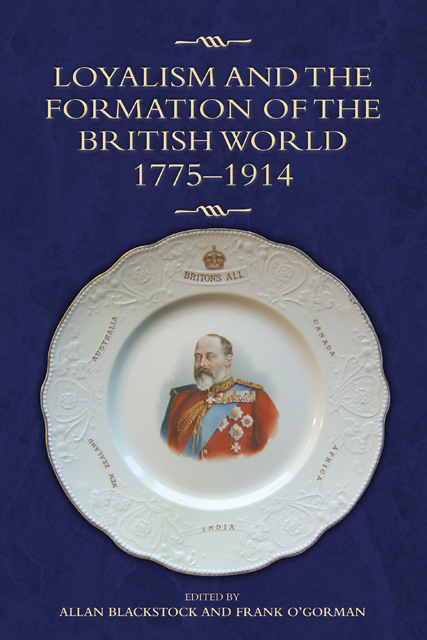Book contents
- Frontmatter
- Contents
- Notes on Contributors
- 1 Loyalism and the British World: Overviews, Themes and Linkages
- 2 Origins and Trajectories of Loyalism in England, 1580–1840
- 3 The ‘Spirit of Loyalty’: Material Culture, Space and the Construction of an English Loyalist Memory, 1790–1840
- 4 Anti-Catholicism and Orange Loyalism in Nineteenth-Century Britain
- 5 Loyalty and the Monarchy in Ireland, c.1660–c.1840
- 6 The Trajectories of Loyalty and Loyalism in Ireland, 1793–1849
- 7 Presbyterians, Loyalty and Orangeism in Nineteenth-Century Ulster
- 8 Unionists and Patriots: James Whiteside, the Irish Bar and the Dilemmas of the Protestant Nation in Victorian Ireland
- 9 Loyalism in British North America in the Age of Revolution, c.1775–1812
- 10 ‘A Colonial Hybrid’: Nineteenth-Century Loyalism as Articulated by the Orange Order in the Maritime Colonies of British North America
- 11 Canadian Catholics, Loyalty, and the British Empire, 1763–1901
- 12 Loyalism in Australasia, 1788–1868
- 13 ‘We love one country, one queen, one flag’: Loyalism in Early Colonial New Zealand, 1840–80
- 14 Clientelism, Community and Collaboration: Loyalism in Nineteenth-Century Colonial India
- Select bibliography
- Index
1 - Loyalism and the British World: Overviews, Themes and Linkages
Published online by Cambridge University Press: 28 February 2023
- Frontmatter
- Contents
- Notes on Contributors
- 1 Loyalism and the British World: Overviews, Themes and Linkages
- 2 Origins and Trajectories of Loyalism in England, 1580–1840
- 3 The ‘Spirit of Loyalty’: Material Culture, Space and the Construction of an English Loyalist Memory, 1790–1840
- 4 Anti-Catholicism and Orange Loyalism in Nineteenth-Century Britain
- 5 Loyalty and the Monarchy in Ireland, c.1660–c.1840
- 6 The Trajectories of Loyalty and Loyalism in Ireland, 1793–1849
- 7 Presbyterians, Loyalty and Orangeism in Nineteenth-Century Ulster
- 8 Unionists and Patriots: James Whiteside, the Irish Bar and the Dilemmas of the Protestant Nation in Victorian Ireland
- 9 Loyalism in British North America in the Age of Revolution, c.1775–1812
- 10 ‘A Colonial Hybrid’: Nineteenth-Century Loyalism as Articulated by the Orange Order in the Maritime Colonies of British North America
- 11 Canadian Catholics, Loyalty, and the British Empire, 1763–1901
- 12 Loyalism in Australasia, 1788–1868
- 13 ‘We love one country, one queen, one flag’: Loyalism in Early Colonial New Zealand, 1840–80
- 14 Clientelism, Community and Collaboration: Loyalism in Nineteenth-Century Colonial India
- Select bibliography
- Index
Summary
In the early twenty-first century, the issue of national identity remains a principal matter of concern not only to academic historians in Britain and the Commonwealth but also, with political Devolution, in the wider context of UK identity politics. This is the case whether it arises in the guise of debates about Britishness, in the re-fashioning of Britain itself in the context of the devolved institutions in Scotland, Wales and Northern Ireland or in the continuing problems of Britain’s relationship with Europe. At the same time, passionate debates occur in Commonwealth countries about identity, involving not only their relationship with Britain but also, as in Australia, New Zealand and Canada, difficult and complex relationships with other races. How rapidly changing national identities are defined and treated in the Commonwealth seems to be just as problematic as it is in Britain. It is to the role of loyalism in the formation and early development of these identities that this volume is addressed.
In the eighteenth century Britain was a complex political entity and one which enjoyed the monarchical, aristocratic and ecclesiastical trappings of an ancien regime. From its political traditions and precedents what we call ‘loyalism’ emerged within Britain and Ireland and was transmitted to the empire overseas. Loyalism was once thought of by historians as a simplistic, almost instinctive, conservative reaction to internal political change or external military threat. However, recent historiography in Britain, Ireland and the British Atlantic, has treated loyalism as much more complex, fluid and multi-faceted. Indeed loyalism, as now seen, was something which reformers as well as conservatives embraced, involving participation ranging from Irish Orangemen and English Church and King fanatics to Irish and Canadian Catholics, native Americans and Canadian reformers. Loyalism therefore was not a single or static entity, either in the British and Irish islands or in the British world, but a dynamic phenomenon with several distinct strands interwoven with the equally diverse ideological position we call patriotism.
The focus of the volume is upon the role of loyalism in promoting and mobilising sentiments of national identity in Britain and Ireland and in the rapidly expanding empire between the seventeenth and the nineteenth centuries. These essays offer several important re-evaluations of loyalism. First, they offer a fresh teleology.
- Type
- Chapter
- Information
- Publisher: Boydell & BrewerPrint publication year: 2014

